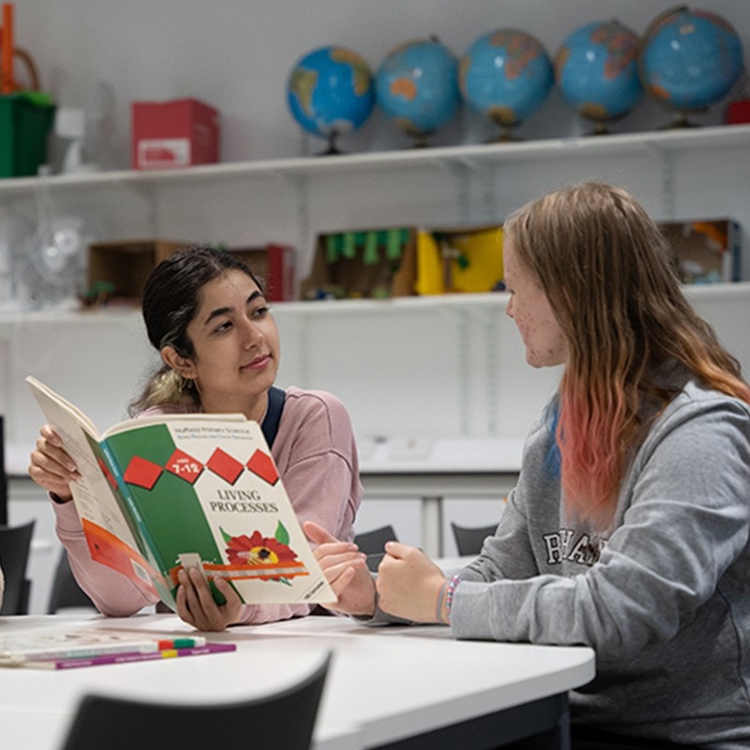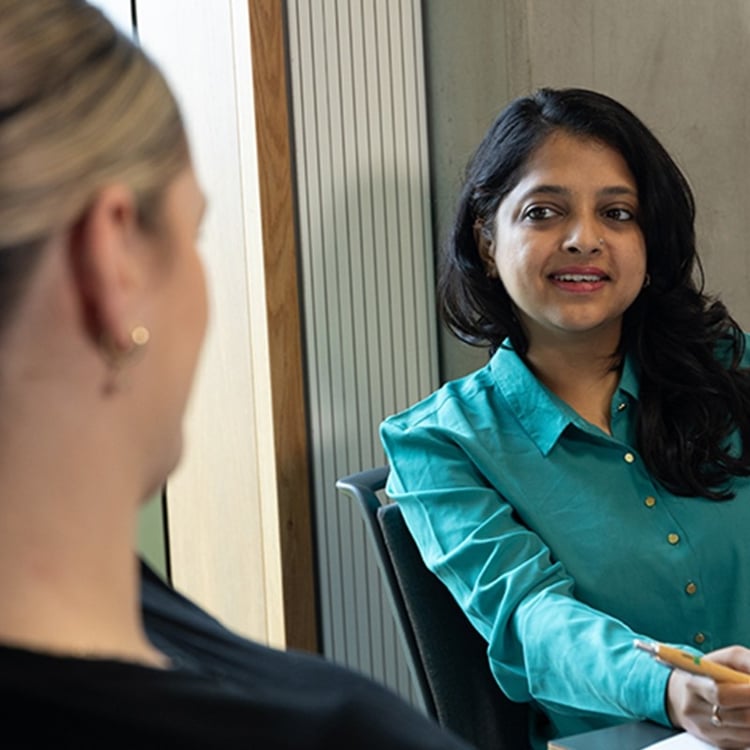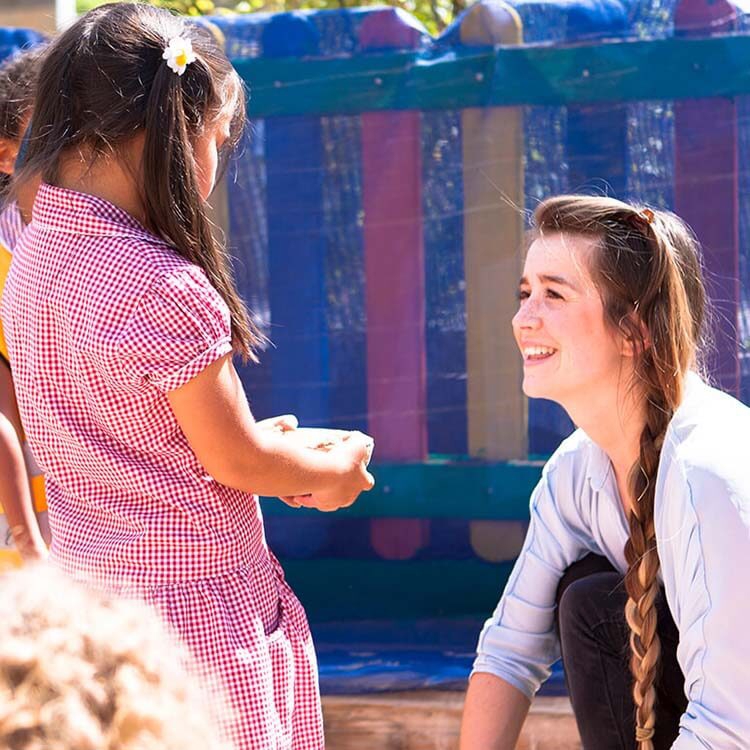Entry tariff:
112–128 UCAS points (or equivalent)
Foundation Year: 64–80 UCAS points (or equivalent)
International Foundation Pathway:
64 UCAS (or equivalent)
IELTS: 5.5
UCAS code:
B620
Start date(s):
September 2025
September 2026
Develop the knowledge and skills to work with people with a range of communication and swallowing disorders for a rewarding career as a Speech and Language Therapist in healthcare or education settings.
Did you know
The course will run when Royal College of Speech and Language Therapy (RCSLT) approval and Health Care Professions Council (HCPC) accreditation has been achieved, meaning that successful graduates will be eligible to be registered professionals with the HCPC, and work as an autonomous Speech and Language Therapist.
You may be eligible to apply for a £5000 NHS bursary.
Top 3 modern university in London
(Complete University Guide 2025)

Ranked in the top 15% in the world
Times Higher Education Young University Rankings 2024

#8 in England for undergraduate student satisfaction
National Student Survey 2024

Modules
This is a new course for September 2025. More details regarding modules will be added shortly. Please contact us if you have any questions.
- Foundations of professional practice for Speech and Language Therapy (30 credits)
- Communication process and building blocks (30 credits)
- Development of eating and drinking and swallowing skills across the lifespan (30 credits)
- Working in partnership 1 (30 credits)
- Practice placement 1
- Person-centered assessment and practice (30 credits)
- Developmental communication disorders across the lifespan (30 credits)
- Acquired communication disorders across the lifespan (30 credits)
- Assessment and management of dysphagia and voice disorders (30 credits)
- Practice placement 2
- Emerging professional practice for Speech and Language Therapy (30 credits)
- Complex communication across the lifespan (30 credits)
- Therapeutic and functional management skills (30 Credits)
- Working in partnership 2 (30 Credits)
- Practice placement 3
This course offers a foundation year, which takes place at the beginning of your studies. Studying a foundation year will give you academic and practical experience, and a strong introduction to your subject, ensuring you succeed on your undergraduate degree.
30 credits
You will develop your core academic and integrated English language skills of speaking, listening, reading and writing. You will become familiar with key academic skills and concepts, such as referencing methods and awareness of academic integrity and tone. You will apply these skills and knowledge to both broad topics and also your chosen subject pathway.
Teaching and learning
You will be required to actively engage in on-campus learning for up to 10 hours a week.
You will be taught through a full range of teaching and learning methods, which include lectures, seminars, workshops, discussion groups, group directed tasks and presentations. This will enable you to learn from your peers and tutors in both structured and information settings.
You will be encouraged to think creatively about your approach to learning and discussions with your peers. You will also have access to recordings, resources, links and signposting through Moodle to enrich your learning.
Assessment
You will be assessed through group and individual presentations, comparative and reflective essays, multiple choice exams, coursework and reports, oral exams, portfolios, case studies and blogs.
30 credits
You will develop your core academic and integrated English language skills of speaking, listening, reading and writing. You will become familiar with key academic skills and concepts, such as referencing methods and awareness of academic integrity and tone. You will apply these skills and knowledge to both broad topics and also your chosen subject pathway.
Teaching and Learning
You will be required to actively engage in on-campus learning for up to 10 hours a week.
You will be taught through a full range of teaching and learning methods, which include lectures, seminars, workshops, discussion groups, group directed tasks and presentations. This will enable you to learn from your peers and tutors in both structured and information settings.
You will be encouraged to think creatively about your approach to learning and discussions with your peers. You will also have access to recordings, resources, links and signposting through Moodle to enrich your learning.
Assessment
You will be assessed through group and individual presentations, comparative and reflective essays, multiple choice exams, coursework and reports, oral exams, portfolios, case studies and blogs.
30 credits
You will develop your research, numeracy and information technology skills. You will investigate the difference between primary and secondary research, conduct your own research project and demonstrate your findings through data analysis. You will also develop your awareness of equality, diversion and inclusion in the UK, through a real-world issue; discrimination in the workplace.
Teaching and learning
You will be required to actively engage in on-campus learning for up to 10 hours a week.
You will be taught through a full range of teaching and learning methods, which include lectures, seminars, workshops, discussion groups, group directed tasks and presentations. This will enable you to learn from your peers and tutors in both structured and information settings.
You will be encouraged to think creatively about your approach to learning and discussions with your peers. You will also have access to recordings, resources, links and signposting through Moodle to enrich your learning.
Assessment
You will be assessed through group and individual presentations, comparative and reflective essays, multiple choice exams, coursework and reports, oral exams, portfolios, case studies and blogs.
30 credits
This module provides an in-depth exploration of the principles, theories and practices underpinning learning and child development. You will gain a comprehensive understanding of the key factors influencing children’s physical, cognitive, social and emotional growth, as well as your implications for effective educational practice. Drawing on foundational theories by Piaget, Vygotsky, Froebel, Skinner and others, this module bridges the gap between theoretical perspectives and practical application in diverse educational contexts.
Through weekly themes, you will examine milestones in child development, the role of play, language acquisition, individual differences, and the impact of external environments, including technology, on learning. Special emphasis is placed on reflective practice, observation, and assessment techniques, as well as strategies to support diverse learners, including those with special educational needs (SEN) and English as an Additional Language (EAL).
This module aims to also develop your critical thinking, analytical skills, and practical expertise, preparing you to create inclusive, supportive, and effective learning environments that foster holistic child development.
Teaching and learning
The teaching delivery for each module consists of one, one-three-hour lecture and one, two-hour seminar per week.
You will have a diverse learning experience of lectures/seminars, case studies, practical sessions and field visits, active learning workshops and microteaches and guest speakers.
You will also have an additional 30 minutes of online support each week to enhance your understanding and learning. This will consist of formal reflection as part of the reflective journal assignment, as well as tutorial support for the informative poster.
Assessment
This module will be assessed using a reflective journal and an information poster.
50% - reflective journal, which documents your learning and insights from each session.
50% - informative poster, you will create an informative poster based on a chosen case study that investigates an aspect of child development.
30 credits
This module explores the relationship between education policies and ethical practices, emphasising your impact on teaching, learning, and professional responsibilities. Through a comprehensive study of key UK and International policies, such as safeguarding, equality, and SEND frameworks, you will critically evaluate how these policies are developed, implemented, and upheld in diverse educational settings.
This module integrates a focus on professional ethics, exploring how educators navigate complex decision-making processes while adhering to policy requirements and maintaining moral and ethical integrity.
The module prepares you to address the challenges of policy compliance and professional accountability while fostering collaboration with diverse stakeholders.
This module also aims to develop your critical thinking, analytical skills, and practical expertise, preparing you to create inclusive, supportive, and effective learning environments that foster holistic child development.
Teaching and learning
By engaging with real-world case studies, global perspectives, and interactive workshops, you will gain the skills to critically analyse policy frameworks, apply ethical reasoning, and ensure inclusive and effective educational practices.
The teaching delivery for each module consists of one, one-three-hour lecture and one, two-hour seminar per week.
You will have a diverse learning experience of lectures/seminars, case studies, practical sessions and field visits, active learning workshops and microteaches and guest speakers.
You will also have an additional 30 minutes of online support each week to enhance your understanding and learning. This will consist of activities to develop your communication skills as well as providing you with opportunities to explore wider policy implementation in diverse/comparative education settings.
Assessment
This module will be assessed using a policy review and a school-based intervention pitch.
40% - policy review, where you will critically evaluate a key education policy.
50% - school-based intervention pitch, you will be design and pitch an intervention aimed at addressing a specific issue related to educational policy and professional ethics.
These are the current planned modules on this course and may be subject to change.

Skills
Make a difference to people's lives with a degree in Speech and Language Therapy.
This programme is a pre-registration course aimed at students wanting to become Speech and Language Therapists. Speech and Language Therapy is a diverse and interesting profession, working with people with communication difficulties and swallowing difficulties.
- Encourage participation and engagement for people with communication and swallowing difficulties.
- Work in a multi-disciplinary team offering support to service users, carers and other professionals.
- Work within a health promotion and advocacy approach.
- Complete a comprehensive person-centered assessment, considering a holistic view of communication, participation and meaningful engagement.
- Give professional advice and support to a range of service users and practice settings, for example with an intervention programme or strategies to support maximizing function.
- Supporting people when their skills are changing, with a future planning approach and considering concepts around adjustment.
- Develop critical thinking skills and apply these within an evidence-based practice approach.
- Audit and research applied to practice settings.
- Use a range of digital technologies to offer innovative assessment and management approaches.
As part of your degree, you will complete 600 hours of practice placement, to support learning in a range of practice settings. Placements have been included in all years of the programme, and will support your professional and practice skills giving an opportunity to apply theoretical knowledge development.
Learning
Experience a dynamic and contemporary curriculum.
You will learn in an environment which integrates theoretical and practice-based learning across the programme. This will include:
- Lectures (both in person and recorded)
- Case-based learning, allowing learners to apply theoretical knowledge with a focus on the experiences of service users and carers
- Group work, and peer supported learning and reflective practice
- Workshops – giving opportunities to use different assessments and technologies applied to practice.
- Placements – simulated learning and case-based discussions, which will encourage active learning through experiential learning and workshop environments.
- Virtual Learning Environment (VLE) to support learning and assessment.

Along with practical skills (analytical and qualitative), you’ll develop the attributes you need to succeed in the workplace, including:
- Professional practice skills including advanced communication skills
- Written and spoken communication skills
- Problem-solving and critical thinking
- Teamwork and interprofessional working
- Attention to detail
- Critical thinking
You’ll also understand the legal, ethical and use best practice approaches involved in working with service users and professionals.

Assessment
Experience a wide range of assessments that enhance your understanding and practical skills.
There will be a focus on the professional practice of Speech and Language Therapy. These include:
- Practical case-based assessments
- Self-reflections
- Peer supported learning, reflection and assessments
- In class tests
- Summary assessment reports
- Therapeutic programmes
- Feedback summaries for patient/carers
- Education sessions and posters
Careers
Shape the future of public health.
If you’re ready to learn, we’ll help you gain confidence and opportunities to achieve.
As a graduate you can go on to work in a range of professions, including working with babies and infants, children, working-age adults and older adults. Practice settings are diverse and include a wide range of services and environments including:
- Hospitals acute and outpatients
- Primary care and community health settings
- Pre-school and nursery settings
- Schools (including mainstream and special schools)
- The criminal justice system
- Specialist services such as mental health and learning disability services and palliative care
- Charity and voluntary sector environments
- There is also scope to work within research and academic settings.

Open days
Get a real taste of our campus, community and what it’s like to study at Roehampton
Applying
Full-time UK undergraduate students apply through UCAS.
Course subject to curriculum review and validation.
Entry tariff
112–128 UCAS points (or equivalent)
Specific entry requirements
Typically, five GCSEs at Grade 5 or above, including Mathematics, English Language or Literature and a science subject or equivalent. A levels BBB/BBC (112 UCAS points), BTEC or equivalent.
There will also be a values-based interview
Additional requirements:
If English is not the applicants first language, the English Language Proficiency level set by Health and Care Professions (HCPC) is that SLTs must “be able to communicate in English to the standard equivalent to Level 8 of the International English Language Testing System, with no element below 7.5”.
HCPC Standards of Education and Training require:
Enhanced Disclosure & Barring Service report on all learners prior to proceeding onto a Speech and Language Therapy programme.
Health and Disability requirements for learners – HCPC requires applicants to be in sufficiently good health to be able to comply with the programme requirements, with reasonable adjustments and necessary support. This requires Occupational Health Screening.
General entry requirements
September 2025 entry tuition fees
UK (home) tuition fees
Undergraduate degree: £9,535
Foundation Year: £9,535
We offer a wide range of scholarships and bursaries. See our financial support pages for UK students.
We also provide other ways to support the cost of living, including free buses and on-campus car parking, hardship support and some of the most affordable student accommodation and catering in London. Find out more about how we can support you.
International undergraduate students apply through our direct application system.
Course subject to curriculum review and validation.
Entry tariff
112–128 UCAS points (or equivalent)
International Foundation Pathway:
64 UCAS (or equivalent)
IELTS: 5.5
Specific entry requirements
Typically, five GCSEs at Grade 5 or above, including Mathematics, English Language or Literature and a science subject or equivalent. A levels BBB/BBC (112 UCAS points), BTEC or equivalent.
There will also be a values-based interview
Additional requirements:
If English is not the applicants first language, the English Language Proficiency level set by Health and Care Professions (HCPC) is that SLTs must “be able to communicate in English to the standard equivalent to Level 8 of the International English Language Testing System, with no element below 7.5”.
HCPC Standards of Education and Training require:
Enhanced Disclosure & Barring Service report on all learners prior to proceeding onto a Speech and Language Therapy programme.
Health and Disability requirements for learners – HCPC requires applicants to be in sufficiently good health to be able to comply with the programme requirements, with reasonable adjustments and necessary support. This requires Occupational Health Screening.
General entry requirements
General entry requirements
September 2025 entry tuition fees
EU and international tuition fees
Undergraduate degree: £16,950
Foundation Year: £16,950
International Foundation Pathway: £16,950
We offer a wide range of scholarships and bursaries. See our financial support pages for international students.
We also provide other ways to support the cost of living, including free buses and on-campus car parking, hardship support and some of the most affordable student accommodation and catering in London. Find out more about how we can support you.





